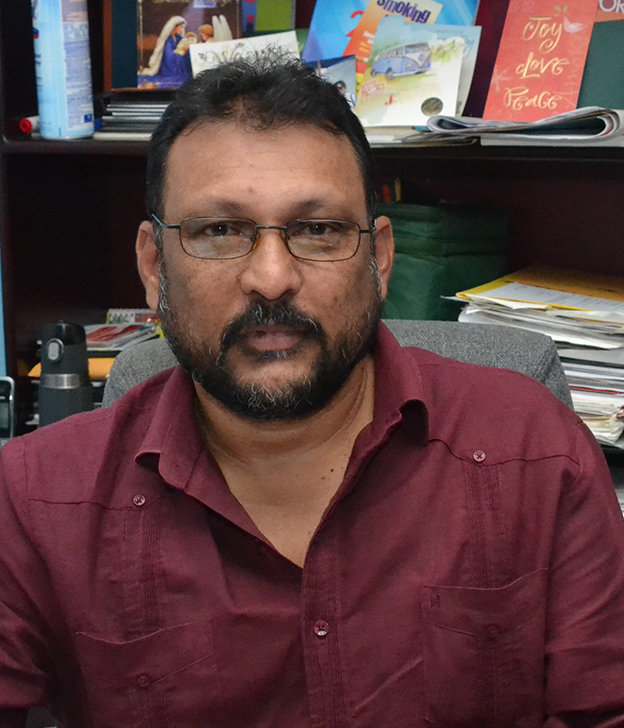Tuberculosis patients are benefiting from an expanded support programme involving the government and the numbers of new cases of the chronic bacterial disease in the prisons has fallen to the lowest figure in 19 years.
In a recent interview with the Department of Public Information (DPI), the Programme Coordina-tor of the National Tuberculosis Programme (NTP), Dr Jeetendra Mohanlall disclosed that from 2012, the numbers of prison infections have been gradually decreasing; with 2018 recording the lowest amount of new cases in 19 years. In fact, at the end of 2018, only eight new cases of Tuberculosis were diagnosed in prisons. This amounts to a significant reduction in new cases usually detected annually in the prisons.
With the low number of TB cases in prisons, the NTP is even closer to achieving and fulfilling its END TB strategy which seeks to eliminate TB as a public health problem by 2030. There are currently four prisons in Guyana: Lusignan, Mazaruni, New Amsterdam and Georgetown.

According to the Programme Coordinator, this reduction “is owed to the robust and effective screening efforts that have been implemented in the prison system through a collaboration with the prison authority and with support from the Ministry of Public Health.”
“We have had a DOTS [Direct Observed Treatment Short-course] Supervisor in the prisons since 2012, and so, we have been doing a lot of work since then in terms of screening cell by cell, block by block. In 2012, we have had 43 new cases in the prisons and over the years because of continuous screening and preventative therapy, last year we have only had 8 new cases in all the prisons,” Dr Mohanlall was quoted as saying.
The DOTS programme was introduced to the prisons in 2000 and there still remains a lot of work to be done for it to be fully effective. The most common type of TB detected in the prisons is Drug-Sensitive TB.
“We had a lot of challenges before where the staff were not fully investigating the patients. For example, they would conduct one part of the investigation and leave out the other part … So, when we evaluated the patients, we found patients before us without proper investigations.” Dr Mohanlall explained.
The programme coordinator admitted that there are still minor challenges that exist but was confident that this will not hinder the DOTS programme in the prisons. He noted that these low numbers indicated that eradicating TB in prisons is possible.
The TB team from the unit at the Georgetown Public Hospital regularly visits the prisons to perform follow-up checks on patients, especially new cases.
Meanwhile nation-wide, the NTP continues to explore ways in which they lend support to patients that are diagnosed and are on treatment. This is to motivate patients to proceed with treatment to achieve the end TB 2030 goal.
Dr Mohanlall told DPI that as of 2018 there were 510 persons diagnosed with Tuberculosis countrywide and 90 per cent of these were on the DOTS Regimen.
Clinic appointments
While this may be noteworthy, he also highlighted that it is critical to ensure the health and well-being of the patients and also to ensure that they attend clinic appointments regularly.
NTP’s DOTS Coordinator, Nicola Nero, explained that there are various types of support that are being made available.
Countrywide, there is the enabler support programme through which hampers, care packages and other tangible means of support are given to patients. These are funded through the Ministry of Public Health, Global Fund and Food for the Poor Guyana.
There is also a pilot ‘Hot meal’ programme for Region Four which accounts for 60 per cent of all cases in the country. Nero explained that while this initiative is welcomed it only caters for those desperately in need which generally includes persons who are Multi-Drug Resistant (MDR) TB, TB-HIV, persons who are sputum positive, persons who are homeless and persons with very low nutritional status.
Along with these means of helping to ensure that patients complete their treatment, they are also counselled and are placed in support groups.
“There are support groups meeting for patients and social workers and the senior medical officer extends visits to patients as well. So, we are hoping that at some point in time we will be able to get transportation refunds for these persons at least so they can attend clinic,” the DOTS coordinator was quoted as saying.
Looking ahead, the NTP is seeking to reach out even further to patients by ensuring they fulfil their obligation of attending clinic regularly.
She added, “When you ask why they didn’t attend clinic; it’s because they don’t have money. So, we are looking into perhaps providing them with a transportation voucher for example. Also, additional vehicles, we are not only looking at persons coming here, but we have to take our services to these people who need it.”
Patients are required to attend clinic when scheduled and be available to receive DOTS in addition to submitting samples when requested by the TB clinic.
Tuberculosis, also known as ‘TB’, is a disease caused by a type of bacteria called Mycobacterium tuberculosis. TB mainly infects the lungs, although it can also affect other organs. When someone with untreated TB coughs or sneezes, the air is filled with droplets containing the bacteria.
In order to help prevent the spread of TB, the NTP advises the following course of actions:
Take all of your medication as prescribed until your doctor takes you off them.
Keep all your doctor appointments.
Always cover your mouth with a tissue when you cough or sneeze. Seal the tissue in a plastic bag, then throw it away.
Wash your hands after coughing or sneezing.
Don’t visit other people and don’t invite them to visit you.
Stay home from work, school, or other public places.
Use a fan or open windows to move around fresh air.
Don’t use public transportation.










